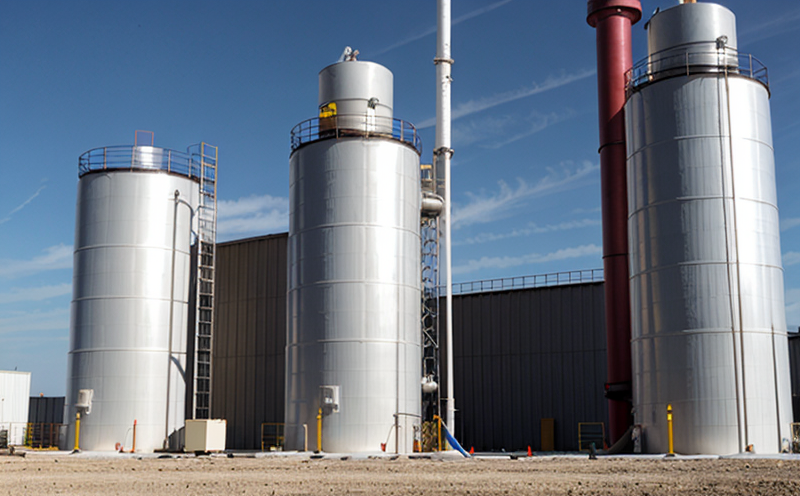ASTM D7036 Stack Testing Accreditation Program Test
The ASTM D7036 stack testing accreditation program is a comprehensive service designed to ensure accurate and reliable measurement of volatile organic compounds (VOCs) in industrial emissions. This test is crucial for industries that are subject to stringent environmental regulations, such as oil refineries, chemical plants, and petrochemical facilities.
Compliance with international standards like ASTM D7036 is essential not only for legal reasons but also to maintain a sustainable approach to production processes. The program involves rigorous calibration of emission measurement instrumentation, ensuring that all tests conducted meet the highest quality standards. This service plays a pivotal role in maintaining environmental compliance and contributing positively to sustainability goals.
The ASTM D7036 stack testing accreditation program is particularly important for facilities where continuous emissions monitoring systems (CEMS) are required by law. The test ensures that these systems operate accurately, thereby providing reliable data for regulatory bodies. By adhering to this standard, companies can avoid potential penalties and improve their reputation as environmentally responsible entities.
The service encompasses a range of activities aimed at ensuring the accuracy and reliability of emission measurements. These include:
- Calibration and verification of emission measurement systems
- Conducting stack tests to measure VOCs in emissions
- Providing detailed reports on test results, including any deviations from expected values
- Training personnel involved in the monitoring process to ensure consistent practices
The service is designed to meet the needs of quality managers, compliance officers, R&D engineers, and procurement professionals. By offering this accreditation program, we help our clients stay ahead of regulatory changes and maintain a competitive edge in their respective markets.
| Applied Standards | Description |
|---|---|
| ASTM D7036-21a | This standard specifies the procedures for sampling and analyzing volatile organic compounds (VOCs) in air emissions from stationary sources. |
| ISO 14151-1:2017 | This international standard provides requirements, recommendations, and guidance on the design, installation, calibration, operation, and maintenance of continuous emission monitoring systems (CEMS). |
| EN 13486-1:2009 | This European standard outlines the principles for sampling and analysis of emissions from combustion processes. |
| IEC TS 62725:2018 | This technical specification provides guidelines for the design, installation, calibration, operation, and maintenance of CEMS used in industrial environments. |
The ASTM D7036 stack testing accreditation program is a vital tool for ensuring compliance with environmental regulations. By adhering to this standard, companies can demonstrate their commitment to sustainability and reduce the risk of non-compliance penalties. The service is tailored to meet the specific needs of various industries, providing accurate and reliable emissions data that is essential for regulatory compliance and operational efficiency.
Benefits
The benefits of adhering to the ASTM D7036 stack testing accreditation program extend beyond mere compliance. By ensuring accurate and reliable measurements of VOCs in emissions, companies can:
- Reduce the risk of non-compliance penalties
- Improve operational efficiency by identifying areas for optimization
- Maintain a positive reputation as an environmentally responsible entity
- Contribute to sustainability goals and reduce environmental impact
The program also provides detailed reports on test results, which can be used for internal audits and continuous improvement initiatives. By staying ahead of regulatory changes and maintaining accurate emissions data, companies can ensure long-term success in their respective industries.
Environmental and Sustainability Contributions
The ASTM D7036 stack testing accreditation program plays a crucial role in promoting environmental sustainability by ensuring that industrial emissions are accurately measured and reported. This service is particularly important for facilities that are subject to stringent environmental regulations, such as oil refineries, chemical plants, and petrochemical facilities.
By adhering to this standard, companies can:
- Reduce the release of harmful VOCs into the atmosphere
- Contribute to cleaner air and a healthier environment
- Improve their reputation as environmentally responsible entities
- Support sustainability goals and contribute positively to climate change mitigation efforts
The program also provides detailed reports on test results, which can be used for internal audits and continuous improvement initiatives. By staying ahead of regulatory changes and maintaining accurate emissions data, companies can ensure long-term success in their respective industries.





